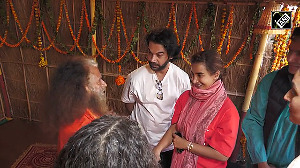The Indo-US nuclear deal, recently endorsed by two influential panels of the United States Congress, comes with a heavy price tag, analysts and experts have said.
Over the past six years, they said, the largest consortium of businesses in India spent more than 1 million dollars on fact-finding trips to India for US members of Congress, their staff, and spouses, and on lobbying Congress to pass a law that would fundamentally change India's relationship with the United States, according to a report in the Boston Globe.
Thanks to all this, India is now all set to become the only country in the world to gain access to sensitive US nuclear technology without signing the Nuclear Non-Proliferation Treaty and agreeing to give up its nuclear arsenal.
In return, India would tighten its export controls and place some of its nuclear reactors under international inspections.
Supporters of the plan have consistently said it is a win-win proposal -- increasing business ties with one of the world's fastest-growing economies and strengthening nuclear safeguards in India at the same time.
But critics say billion-dollar business interests -- in the United States as well as India -- have trumped the decades-old policy of trying to get India to give up its nuclear weapons programrame.
They point to the massive, behind-the-scenes lobbying effort by the confederation and the U S businesses as proof.
But one of the quietest and most persistent efforts to influence Congress on India policy has come from the Confederation of Indian Industry, which represents some of India's most profitable companies, according to the report.
The group was among the top international organisations paying for Congressional travel between 2000 and 2005, even though they were not registered to lobby at the time, according to a review of Congressional disclosure records conducted by the Center for Public Integrity, a nonprofit research organisation in Washington.
During that period, they paid more than 538,000 dollar in travel expenses for trips by 19 Congress members, 11 spouses, and 58 Congressional staffers, according to the records.
Of the 50 members serving on the House International Relations Committee, eight had trips to India paid for by the Confederation, traveling or sending a staffer.
One of the eight representative Barbara Lee, a California democrat, voted against the proposal last week when the committee overwhelmingly approved the deal.
In April 2005, the confederation registered to lobby for the first time, paying Barbour Griffith & Rogers, a well-connected lobbying firm, $ 520,000 to lobby US government agencies, including the Congress, the White House, the State Department, and the Department of Defense.






 © 2025
© 2025